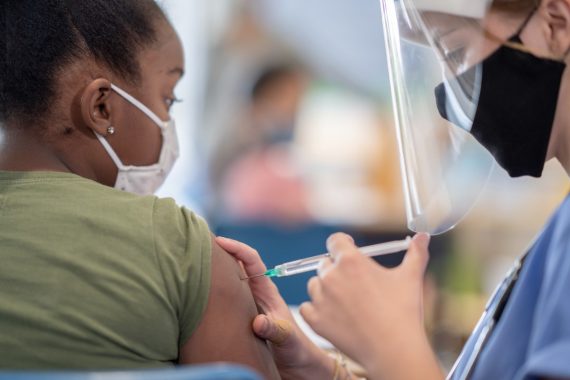Covid jab should be delayed by three months after positive test in under-18s

Covid vaccination should be delayed for 12 weeks following a positive Covid test results in children aged 12-17, according to new guidance.
It follows guidance from the Joint Committee on Vaccination and Immunisation earlier this week that 16- and 17-year-olds should book their second vaccine 12 weeks after the first.
The updated advice on vaccination after infection in under-18s from the UK Health Security Agency is based on emerging evidence from the UK and other countries that leaving a longer gap may further reduce the already small risk of myocarditis.
In younger people, protection from natural infection is likely to be high for at least three months so they will be protected against Covid-19 infection for some time and teenagers and parents should not be concerned about deferring the date when they can get vaccinated to 12 weeks, UKHSA officials said.
Those under the age of 18 in a clinical at-risk group should still have a vaccine four weeks after a positive test and to receive their second dose eight weeks after the first.
Dr Mary Ramsay, head of immunisations at UKHSA, said: ‘The Covid-19 vaccines are very safe. Based on a highly precautionary approach, we are advising a longer interval between Covid infection and vaccination for those aged under 18.
‘This increase is based on the latest reports from the UK and other countries, which may suggest that leaving a longer interval between infection and vaccination will further reduce the already very small risk of myocarditis in younger age groups.’
‘Young people and parents should be reassured that myocarditis is extremely rare, at whatever point they take up the vaccine, and this change has been made based on the utmost precaution.’
Rare side effects of myocarditis occur within a few days of vaccination and most of those affected have recovered after rest and simple treatments, UKHSA said.
Symptoms of myocarditis to look out for include:
- pain and/or tightness in the chest which may spread across the body
- pain in the neck that may spread across the shoulders and/or arms
- shortness of breath when lightly exercising or walking
- difficulty breathing when resting or feeling light-headed
- flu-like symptoms such as a high temperature, tiredness and fatigue
- palpitations or an abnormal heart rhythm
- feeling like you need to be sick
Click to complete relevant paediatrics CPD modules on Pulse learning.
Visit Pulse Reference for details on 140 symptoms, including easily searchable symptoms and categories, offering you a free platform to check symptoms and receive potential diagnoses during consultations.
Related Articles
READERS' COMMENTS [1]
Please note, only GPs are permitted to add comments to articles










Is Covid testing in Primary School children and teachers a bit ‘over the top’ or do the criteria need to be re-set for closing whole schools or school Years. This is the 3rd successive School year in which Primary children are losing their education and won’t this have major impacts for many children’s futures? especially when you consider so many young children are completely symptomless, not even a small cough or a sniffle and not likely to spread anything much: but they are keen to learn and to have good social skills for life.
Perhaps Nadhim Zahawi, Education Secretary, Sajid Javid, Health. and so-called ‘Winston Churchill’ Johnson, (fit to be a Prime Minister?) will correct this important matter before Christmas. Perhaps they have different health and education criteria at Eton and some other schools for elites. Under 18s matter, and younger kids too, and not just by immunising some.